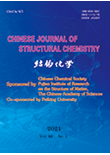Carbazole
Based Anionic MOF for Proton Conductivity
GUO Shan-Shan, HUANG Lv-Lan, YE Ying-Xiang, LIU Li-Zhen, YAO Zi-Zhu, XIANG Sheng-Chang, ZHANG Jin-Dan and ZHANG Zhang-Jing*
Chin. J. Struct. Chem. 2021, 40, 55-60 DOI: 10.14102/j.cnki.0254-5861.2011-2761
January 15, 2021
metal-organic frameworks, carbazole, proton conductivity
ABSTRACT
A
non-interpenetrated anionic In-MOF (FJU-302) based on a linear H2bpdc
and an angled H2cdc as dual-ligands was characterized by
FT-IR, TGA and X-ray single-crystal/powder diffraction. FJU-302 crystallizes in the monoclinic system and I41/amd space group with a = 27.1274(8), b = 27.1274(8), c = 29.788(3) Å, V = 21921(2) Å3, Z = 16, Mr = 608.32, Dc = 0.737 g/cm3, F(000) = 4848, μ(CuKα) = 3.659 mm–1, R =
0.0800 and wR = 0.1911 for 5703 observed reflections (I > 2s(I)), and R = 0.1470 and wR =
0.2342 for all data. In this work, a carbazole based anionic In-MOF (FJU-302) was designed and synthesized, and
the proton conductivity from subzero temperature (–30 °C) to 70 °C was measured
without additional humidity. FJU-302 presents a max proton conductivity of 6.47 × 10–4 S·cm–1 at 70 °C, and it can maintain 5.88 × 10–7 S·cm–1 at –30 °C. This work reports a first carbazole based MOF for proton conductivity
at subzero temperature conditions.








